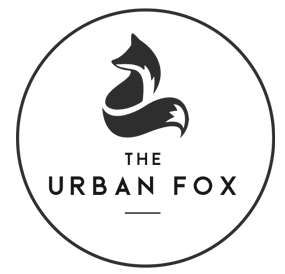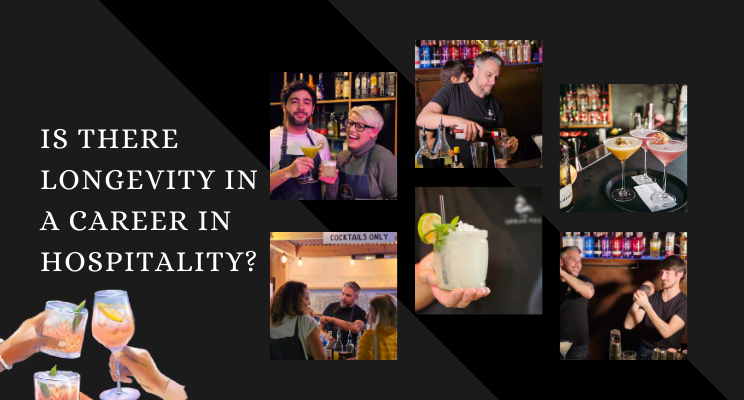Over the years, it has almost become a tradition that a role within hospitality is an “add-on job” a “stop-gap”, a job that is done whilst studying to build a future career in another industry. Whereas this is certainly acceptable and works well for some businesses and individuals, it is a shame that a role within hospitality is not more often seen as a career itself. At The Urban Fox cocktail bar, we, ourselves have many in our team that manage to successfully juggle their role with us and their main commitments whilst still exhibiting energy and passion and displaying the resilience often needed for the hospitality industry. Where possible, we always offer the team the opportunity to bring the skills from the focus of their lives to the workplace, to ensure we are not excluding what drives them and allowing these talents to thrive alongside their work with us.
However, many of us, Thom (the owner of the business) and I included, do not see hospitality as a secondary commitment, it is our career, our passion for a challenging industry and our drive to diversify and succeed in an ever-changing and fast-paced landscape.
How do we aim to provide an environment for change?
At The Urban Fox, as a small independent, we want our team to grow with the business, forge a career in the industry and let their passion and energy develop their ideas in conjunction with the bar to make them feel fulfilled and empowered. We are entering a new phase in the business where we feel helping others to build a career in hospitality is continually possible. Thom, the owner, has been successfully working towards this goal since he started the business, a goal we both believe is achievable and an initiative and framework that we can pass to others as we progress.
Thom opened the business with the aim of creating an environment to allow individuals to thrive, along with many other positive, industry-disrupting goals. After years of managing, consulting for and overseeing businesses in the nighttime hospitality sector, he knew, from personal experience that something needed to change. Opportunities need to be more widely available, and individuals need to be shown support and recognition and treated as an asset and not a disposable commodity. Time and space needed to be given to share ideas and crucially feedback without negative consequences, stemming from a lack of confidence from those peers who had not been afforded the same courtesy in the past. These are all elements that are present in most industries but historically have taken a back seat in hospitality, in what has sometimes become an impersonal and disconnected team management structure, due to traditional processes and no change in operations or culture from the top down.
I, started in the hospitality industry at the age of fourteen in a kitchen, taking every opportunity thrown at me and learning so many new skills from my employers and colleagues, but it often came at a cost and the hours were more than that of my peers with lower remuneration. I got my personal licence at 19 and continued in a management role front of house for a few years, but the industry takes its toll when traditional hospitality values are in place and I decided a break was needed because of it, and ended my career in hospitality, never wanting to look back. Nine years later, I started at The Urban Fox looking for a “fun bar job” a secondary commitment, but the environment provided served as a reminder of my passion for hospitality and it became the new direction for my career and continues to be three years on. It was great to find a role where the business shared my belief that hospitality can be fulfilling, challenging, and exciting.
Since then, the business has worked to instil these values in the team whilst remaining a place that supports those who also have other focuses.
What is the story behind the push for change?
When I asked Thom the owner of the business, here is what he had to say about his approach and what he wanted for the business.
“I spent a substantial portion of my career in hospitality (over 20 years) working for a variety of companies, from your mid-level independents to the largest corporate operators in the industry. During this time, I often (but not always) saw the same attitude towards the teams employed at site level one not far from disdain. Paying the bare minimum possible while still somehow managing to staff a venue (often barely) taking no interest in them or their individual needs, how to motivate, train and develop them then managing to be surprised that they could not retain a team and their turnover was insane, “why train them properly when they aren’t going to stay anyway!?”
The lack of quality invested employees meant the next generation of leaders was comprised of those staff members who turned up. Not those who genuinely loved the industry and wanted to build a career and grow. This then started a whole new cycle spiralling down. Those who shone and had passion succeeded, despite how they had been treated, despite the lack of training and development, and those who had to put in the work and developed themselves in their own time. Now yes, while this accidentally created some superstars (and those quality leaders should stand up and be especially proud of what they have achieved) overall it has dramatically hurt the industry itself. While most other industries changed and improved their treatment of their employees invested in HR and team mental health, hospitality remained steadfast in holding to its roots.
I remember while working as an Area Manager for one of the largest operators of venues in the U.K. having to fight to get my managers and their venue staff a fair wage let alone an attractive one. The director I dealt with simply could not see the value in these investments, he looked at me with an expression that could only be described as a mixture of confusion and pity at my naivety. This simply was not “what was done” Imagine the madness, trying to change the status quo! The idea is that paying above minimum wage, a figure that could mean your core team members did not need to exhaustedly work two or three jobs just to survive. They could focus on your business while you trained them and they were motivated for the success of both the business
and in turn their own, as they started to envision this bar job becoming a career, this train of thought was simply beyond understanding.
The whole “well I HAD to do that when I was coming up the ranks” mentality of Managers was another hurdle I had faced.
“I had to work over 80 hours a week on a low salary so they can too”.
“I had to work in the kitchen getting screamed at by senior chefs.”
“My manager treated me like garbage, they don’t know how good they have it, I barely shout at them”?
In my experience that old-school hospitality mentality bred two kinds of future leaders. Those who ensured what they went through would be repeated in an ongoing cycle and those who stopped and said, “I endured that, so I’ll make sure no one I work with has too again.” Those who changed and tried to improve things for the next generation generally found their work lives made much easier by improved retention with better trained, invested, passionate teams. Weird that…. Maybe there is a connection there.
All of this was going through my head when I decided to open my venue. We would start with the team, ensuring there was a vision and mission statement they were all aware of and a goal for the business. That they were paid well above the top-level minimum wage regardless of age. Whether they were an 18-year-old fully trained bartender or a 45-year-old bartender, they would all receive the same rate. They would be trained and invested in, they would not receive ridiculous rotas that did not care about their lives/ lack of sleep or lack of time to live. Both they and their opinions were valued, if they found a better way to do something or produce a better product, we as a business could adapt and change not simply assume that I with all my experience knew better. Realising that sometimes that fresh-faced 19-year-old may have a better handle on something than you, can be incredibly humbling! The personal growth it opens for you though, is liberating.
Essentially, what I’m saying is hospitality should be seen as a viable career option, not a last resort, a stopgap to make ends meet until something better comes along or just a side job with no future. However, it will take a lot more leaders to invest in their teams and their future before it does.”
How are we going to promote hospitality as a career?
We aim to offer the opportunity to work with an independent business, we will listen to the needs of the team to make sure we get the work/life balance correct. To make them feel confident to share their ideas and include them in business processes so they can learn as much as possible. It would be brilliant to have these individuals with us long-term term but even more exciting to think of producing the next generation of like-minded hospitality business owners. We are not saying that someone must stay with us forever, but we can help to equip them with the skills they need to build and grow a career in hospitality if they ever do wish to move on, rather than leaving the whole industry through frustration.
Who are we looking for?
We will be looking for those whose sole focus is to forge a career and hope that we can show them that it is possible within this industry. Given the right guidance and understanding, there is the possibility to build a wide range of skills within any hospitality business, from marketing to basic accounting, mixology to photography, social media management to sales, interpersonal skills to event management, recruitment processes, business growth and project management, to name a just a few. A career in hospitality can truly be tailored to the needs of the individual and given enough drive and imagination can be exactly what they want to make it; the possibilities are endless.
If you are interested, please get in touch via email at sales@urbanfoxbar.com

